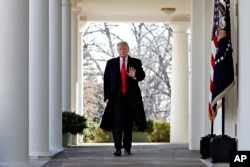The last defenders of the Islamic State terror group's self-proclaimed caliphate are surrounded in a small neighborhood in the eastern Syrian village of Baghuz, facing imminent defeat.
The assessment Saturday, from a commander of the U.S.-backed Syrian Democratic Forces, follows days of slow and difficult fighting as IS fighters cling to an ever-shrinking sliver of land, pausing only for intermittent negotiations over a possible surrender.
"In a very short time, we will spread the good tidings to the world of the military end of Daesh," Jiya Furat, the SDF commander leading the final assault, told reporters during a news conference outside Baghuz.
Furat said the self-proclaimed caliphate, which once covered large swaths of Syria and Iraq, had been reduced to an area covering no more than about 600 square meters, and that IS fighters were coming under fire from every direction.
But efforts to finish off the final IS enclave have been slowed due to concerns about civilians, including the wives and children of the terror group's fighters, trying to escape to safety.
"There have been some lapses in the battle as we continue to see hundreds of civilians still attempting to flee," coalition spokesman, Col. Sean Ryan, told VOA via email Saturday. "Strikes have been reduced to help protect the civilians."
Those civilians who have escaped say IS has been using them as human shields, shooting at them if and when they attempt to leave.
The SDF advance has also been slowed by IS' use of booby traps and other improvised explosive devices [IEDs], and counterattacks using suicide bombers and cars or motorcycles laden with explosives.
There are also concerns about additional IS fighters hiding in what appears to be an extensive system of tunnels and caves.
Monitoring groups, including the Syrian Observatory for Human rights, reported a group of IS fighters launched a counterattack late Friday, targeting coalition-backed forces near the al-Azraq oilfield. But they said the assault was quickly repelled with the help of coalition warplanes.
Just days ago, coalition officials had described the fight against IS in its final hold-out of Baghuz as a clearing operation, with one top commander saying, "The end of the physical caliphate is at hand."
And on Friday, U.S. President Donald Trump stirred up anticipation that a final declaration of victory over the IS was fast-approaching.
"We have a lot of great announcements having to do with Syria and our success with the eradication of the caliphate," Trump said at the White House. "That'll be announced over the next 24 hours."
On Saturday, though, both coalition officials and the SDF suggested there was no longer any set timeline for an announcement.
U.S. officials have also been quick to point out that even once the last pocket of IS-held territory is taken, the fight will not be over.
Speaking at the Munich Security Conference in Germany Saturday, U.S. Vice President Mike Pence promised the U.S. would maintain a strong presence in the Middle East and would "track down" any remnants or offshoots of the Islamic State.
Top U.S. military officials have warned the terror group still has 20,000 to 30,000 followers, including fighters, spread across Syria and Iraq. And they worry about the ability of their Syrian partners, in particular, to keep IS in check once U.S. troops withdraw.
The U.S. official has also been talking with other members of the coalition about increasing their help as U.S. troops prepare to leave. But so far, other coalition members, many of whom have no troops on the ground in Syria, have been unwilling to make any specific commitments.
"I think there's a tremendous desire to have a security arrangement or mechanism that doesn't result in a security vacuum. What that is…is still being developed," a senior defense official said Friday on the sidelines of the Munich Security Conference.
"We've been pretty clear that this is going to be a deliberate withdrawal," the official added. "There's a timeline associated with that that's conditions-based. We've said publicly on a number of occasions that it will be here in months, not weeks and not years."









